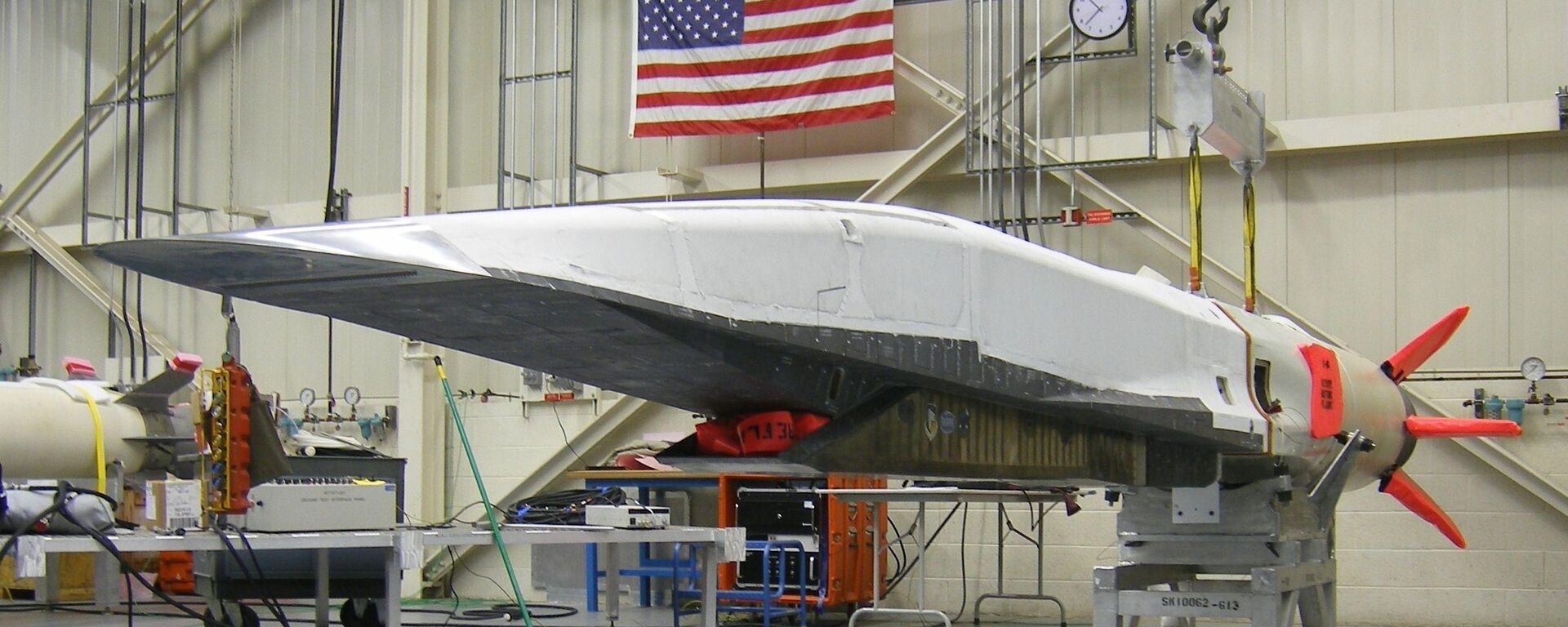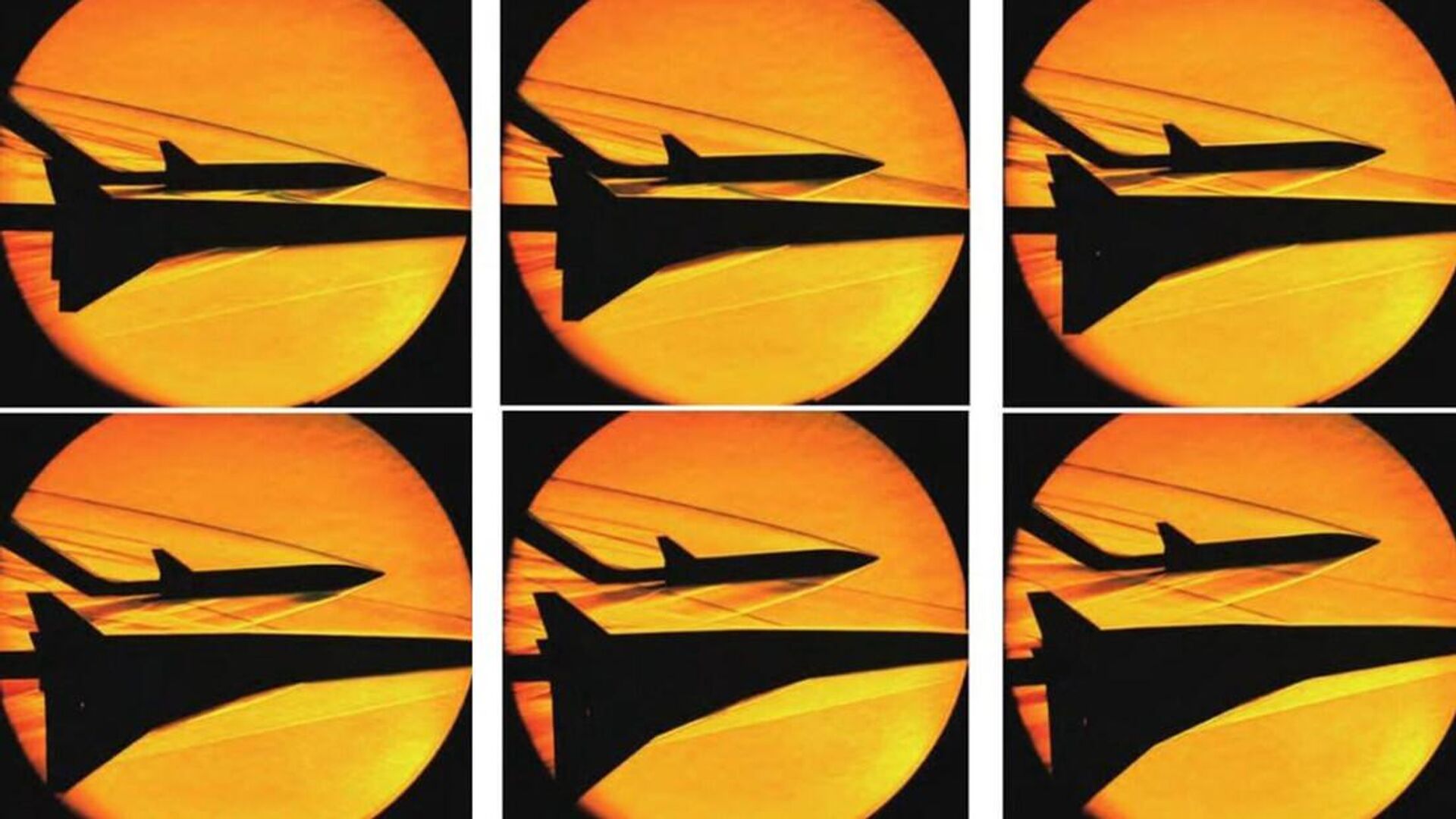https://sputnikglobe.com/20220923/chinese-scientists-use-cutting-edge-wind-tunnel-precision-robot-arms-to-simulate-hypersonic-bombing-1101152158.html
Chinese Scientists Use Cutting Edge Wind Tunnel, Precision Robot Arms to Simulate Hypersonic Bombing
Chinese Scientists Use Cutting Edge Wind Tunnel, Precision Robot Arms to Simulate Hypersonic Bombing
Sputnik International
The tests are being conducted at the China Aerodynamics Research and Development Centre’s (CARDC) Hypervelocity Aerodynamics Institute in Mianyang, central... 23.09.2022, Sputnik International
2022-09-23T18:54+0000
2022-09-23T18:54+0000
2022-10-19T18:49+0000
military
hypersonic
china
robotics
asia
https://cdn1.img.sputnikglobe.com/img/07e6/09/17/1101152013_0:1:1104:622_1920x0_80_0_0_0ce7f0eadc7fbf05fc170684b12506b8.jpg
Scientists from China have incorporated advanced robotics technology into an advanced captive trajectory system (CTS) designed to assist in wind tunnel-based simulations of ultrahigh-speed bombing runs and other tests involving complex hypersonic flight.In a research paper published this week in Acta Aerodynamica Sinica, a Chinese peer-reviewed mechanical engineering journal, researchers explained that unlike conventional CTS designs that have been around since the 1960s, which rely on small cranes to move objects away from aircraft to simulate decoupling at high speeds (and thus determine whether a bomber design or its bombs, for example, are aerodynamically sound), their system incorporates a pair of advanced precision robotic arms which carefully hold the mock aircraft and its cargo in place and allow them to be manipulated.The system necessitated the creation of custom sensors and computer algorithms and communications equipment to address challenges posed by the simulation of hypersonic flight, which creates electronically charged particles that can jam ordinary electronics.The CTS was designed by a team of researchers at the China Aerodynamics Research and Development Centre led by Lin Jinzhou, a veteran aerodynamics specialist whose team created the world’s first first captive trajectory system boasting the ability to withstand extreme speed shock waves in 2017.In the paper published in Acta Aerodynamica Sinica, Lin et al. reported that the arms have so far been used to simulate decoupling of cargos at speeds of up to Mach 6 (7,350 kph).Further testing using the Mianyang wind tunnel and Lin and co.’s robotic CTS is expected to gather comprehensive data of air flow patterns in extreme conditions to ensure safety, something that’s always important in aerodynamic analyses, but especially so at hypersonic speeds in which the force of wind can be equivalent to that of explosions.The wind tunnel used in the extreme testing was opened earlier this month, and is a free-piston driven tunnel based on a design pioneered by Australian space engineer Raymond Stalker.The People’s Republic is a major power in the field of hypersonic technology, and became the second country in the world after Russia to field a hypersonic weapon – the DF-ZF hypersonic glide vehicle, in 2019.
https://sputnikglobe.com/20220915/japan-us-to-expand-cooperation-on-hypersonic-missile-defense-systems---defense-ministry-1100791890.html
https://sputnikglobe.com/20220908/china-opens-record-breaking-hypersonic-wind-tunnel-able-to-reproduce-mach-33-speeds-1100567169.html
china
Sputnik International
feedback@sputniknews.com
+74956456601
MIA „Rossiya Segodnya“
2022
News
en_EN
Sputnik International
feedback@sputniknews.com
+74956456601
MIA „Rossiya Segodnya“
Sputnik International
feedback@sputniknews.com
+74956456601
MIA „Rossiya Segodnya“
hypersonic, china, robotics
hypersonic, china, robotics
Chinese Scientists Use Cutting Edge Wind Tunnel, Precision Robot Arms to Simulate Hypersonic Bombing
18:54 GMT 23.09.2022 (Updated: 18:49 GMT 19.10.2022) The tests are being conducted at the China Aerodynamics Research and Development Centre’s (CARDC) Hypervelocity Aerodynamics Institute in Mianyang, central China, where a new high-powered wind tunnel capable of recreating extreme flight conditions at speeds of up to Mach 33 (40,748 km per hour), was opened earlier this month.
Scientists from China have incorporated advanced robotics technology into an advanced captive trajectory system (CTS) designed to assist in wind tunnel-based simulations of ultrahigh-speed bombing runs and other tests involving complex hypersonic flight.
In a research paper published this week in Acta Aerodynamica Sinica, a Chinese peer-reviewed mechanical engineering journal, researchers
explained that unlike conventional CTS designs that have been around since the 1960s, which rely on small cranes to move objects away from aircraft to simulate decoupling at high speeds (and thus determine whether a bomber design or its bombs, for example, are aerodynamically sound), their system incorporates a pair of advanced precision robotic arms which carefully hold the mock aircraft and its cargo in place and allow them to be manipulated.
The arms allow objects to be rotated, pitched and rolled in virtually any direction, and feature 12 independent joints, allowing for a wide array of testing on objects' behavior during in simulated flights.
The system necessitated the creation of custom sensors and computer algorithms and communications equipment to address challenges posed by the simulation of hypersonic flight, which creates electronically charged particles that can jam ordinary electronics.
The CTS was designed by a team of researchers at the China Aerodynamics Research and Development Centre led by Lin Jinzhou, a veteran aerodynamics specialist whose team created the world’s first first captive trajectory system boasting the ability to withstand extreme speed shock waves in 2017.

15 September 2022, 03:04 GMT
In the paper published in Acta Aerodynamica Sinica, Lin et al. reported that the arms have so far been used to simulate decoupling of cargos at speeds of up to Mach 6 (7,350 kph).
Scientists expect the system to prove useful in both military and civilian applications – including a proposed two-stage transport system which can take passengers from one continent to another in just one hour using a large hypersonic aircraft.
Further testing using the Mianyang wind tunnel and Lin and co.’s robotic CTS is expected to gather comprehensive data of air flow patterns in extreme conditions to ensure safety, something that’s always important in aerodynamic analyses, but especially so at hypersonic speeds in which the force of wind can be equivalent to that of explosions.
The wind tunnel used in the extreme testing was opened earlier this month, and is a free-piston driven tunnel based on a design pioneered by Australian space engineer Raymond Stalker.

8 September 2022, 22:58 GMT
The People’s Republic is a
major power in the field of hypersonic technology, and became the second country in the world after Russia to field a hypersonic weapon – the DF-ZF hypersonic glide vehicle, in 2019.




